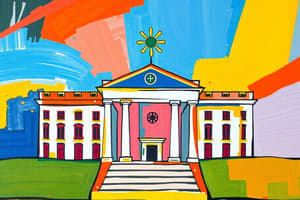Podcast
Questions and Answers
What is the principle that allows the government to create and enforce laws to maintain order and protect individual rights?
What is the principle that allows the government to create and enforce laws to maintain order and protect individual rights?
- Divine right
- Rule of law (correct)
- Unitary system
- Confederation
Which term describes the system that divides power between a central government and regional governments?
Which term describes the system that divides power between a central government and regional governments?
- Limited government
- Parliamentary system
- Federalism (correct)
- Popular sovereignty
Which of the following best describes the concept of judicial review?
Which of the following best describes the concept of judicial review?
- The ability of courts to check the powers of legislative bodies (correct)
- The principle of separating judiciary from executive functions
- A method for amending the Constitution
- Regulation of financial institutions
What is the term for the legal protection against being tried for the same crime multiple times?
What is the term for the legal protection against being tried for the same crime multiple times?
Which system of government features a division of powers among an executive, legislative, and judicial branch?
Which system of government features a division of powers among an executive, legislative, and judicial branch?
Flashcards
Divine Right
Divine Right
The belief that a ruler's authority comes directly from God, giving them absolute power.
Limited Government
Limited Government
A system where the government's power is restricted, often through a constitution or other legal documents.
Constitution
Constitution
A set of fundamental principles and laws that govern a country, outlining the powers and responsibilities of the government.
Rule of Law
Rule of Law
The principle that everyone is subject to the same laws, no one is above the law.
Signup and view all the flashcards
Amendment
Amendment
A formal change or addition to a constitution or law.
Signup and view all the flashcardsStudy Notes
Divine Right
- Belief that a ruler's authority comes directly from a divine source (e.g., God).
Limited Government
- Principle that government power should be restricted to prevent tyranny.
Constitution
- Fundamental law establishing a nation's framework of government.
Rule of Law
- Principle that everyone, including those in power, is subject to the law.
Amendment
- Modification or addition to a legal document, typically a constitution.
Double Jeopardy
- Legal principle prohibiting a person from being tried twice for the same crime.
Self-Incrimination
- Right to avoid testifying against oneself in a legal proceeding.
Federalism
- System of government dividing authority between national and regional governments.
Popular Sovereignty
- Principle that the ultimate political authority rests with the people.
Checks and Balances
- System where different branches of government limit each other's power.
Separation of Powers
- Distribution of governmental powers among distinct branches (executive, legislative, and judicial).
Republicanism
- System of government where elected representatives act on behalf of the people.
Unitary System
- Government where all power is concentrated in a central authority.
Confederation
- System of government where individual states retain most of the power.
Parliamentary System
- System where the executive branch is formed from and accountable to the legislative branch.
Legislative
- Branch of government responsible for creating and enacting laws.
Executive
- Branch of government responsible for enforcing laws.
Judicial System
- Branch responsible for interpreting and applying laws.
Congress
- Legislative body (often bicameral) in a federal system.
Bureaucracy
- Large administrative structure of government, often complex and hierarchical.
Judicial Review
- Power of a court to determine the constitutionality of laws.
Jurisdiction
- Area of authority for a court or other entity.
Bicameral
- Legislature composed of two houses.
Due Process
- Fundamental legal right to fair treatment in legal proceedings.
Policy
- Course of action taken by a government to address a problem or achieve a goal.
Revenue
- Income generated by a government through taxes, fees, etc.
Expenditure
- Government spending on programs and services.
Regulations
- Rules or laws that control activities in a particular area.
Fiscal Policy
- Government's use of spending and taxation to influence the economy.
Monetary Policy
- Actions taken by a central bank to control the supply of money and credit.
Foreign Aid
- Financial or other assistance given by one country to another.
Apportionment
- Allocation of representation in a legislature based on population.
Census
- Official population count, often used to reapportion seats in legislature.
Judicial Activism
- Judicial philosophy where judges actively shape social and legal policy.
Judicial Restraint
- Judicial philosophy where judges limit their role to interpreting existing laws.
Lobbying
- Seeking to influence government policy through organized efforts.
Gerrymandering
- Manipulating electoral district boundaries to favor one political party.
Studying That Suits You
Use AI to generate personalized quizzes and flashcards to suit your learning preferences.




